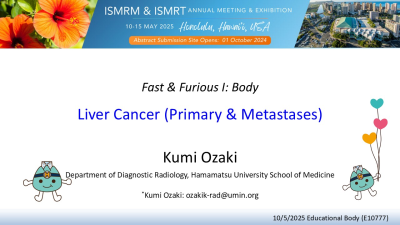Weekend Course
Fast & Furious I: Body
ISMRM & ISMRT Annual Meeting & Exhibition • 10-15 May 2025 • Honolulu, Hawai'i

| 08:00 |
Introduction & Fast & Furious Body Protocols Overview
Ruth Lim
Impact: Streamlining body MRI protocols tailored to the
clinical question is important for clinical care, scan
efficiency and sustainability of MRI services. This lecture
provides a review of abbreviated body MRI protocols for
various indications and current evidence for their use.
|
|
| 08:25 |
Fast & Furious Body Protocols - Technical Considerations
Joshua Trzasko
Impact: Body Imaging faces a number of technical
challenges ranging from varying anatomies, motion,
physiological limitations (e.g., breath-holding), and
complex artifacts. In this talk we will highlight some of
advanced MRI technologies used to both expedite and harden
body MRI protocols.
|
|
| 08:50 |
AI Reconstructions for Speed
Efrat Shimron
|
|
| 09:15 |
 |
Liver Cancer (Primary & Metastases)
Kumi Ozaki
Impact: The presentation highlights successful
applications of abbreviated MRI protocols for liver cancer,
including both primary tumors and metastases. It illustrates
how these protocols can enhance MRI workflow and discusses
potential future directions for their use.
|
| 09:40 |
Break & Meet the Teachers |
|
| 10:10 |
Diffuse Liver Disease
Jin Wang
|
|
| 10:35 |
Breast Cancer Screening
Katja Pinker-Domenig
Impact: Abbreviated DCE-MRI protocols substantially
shorten image acquisition and interpretation time, allow
higher volume patient throughput while maintaining a high
diagnostic accuracy offering a cost-effective screening
breast DCE-MRI to a broader population.
|
|
| 11:00 |
Prostate Cancer
Ryan Brunsing
Impact: Prostate MRI plays a central role in the
detection, diagnosis, and surveillance of prostate
cancer. In this talk we discuss approaches to reducing
sequences, improving robustness, and shortening Prostate
MRI image acquisition times through pulse sequence
optimization and AI technologies.
|
|
| 11:25 |
Pancreaticobiliary
Chenchan Huang
Impact: MRI with MRCP offers a fast, cost-effective, and
radiation-free approach for pancreatic cyst surveillance,
and abbreviated non-contrast protocol may be a viable
alternative.
|
|
| 11:50 |
Conclusion & Q & A
Christoph Rettenmeier, Aaryani Tipirneni-Sajja
|
The International Society for Magnetic Resonance in Medicine is accredited by the Accreditation Council for Continuing Medical Education to provide continuing medical education for physicians.